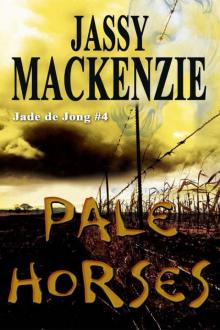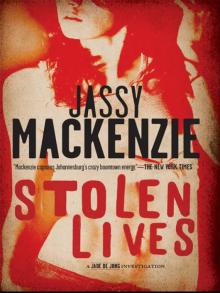- Home
- Jassy Mackenzie
Random Violence
Random Violence Read online
Random Violence
Random Violence
Jassy Mackenzie
To Dion—now, always and forever
Copyright © 2008, 2010 by Jassy Mackenzie
All rights reserved.
Published by
Soho Press, Inc.
853 Broadway
New York, NY 10003
Library of Congress Cataloging-in-Publication Data
Mackenzie, Jassy.
Random violence / Jassy Mackenzie.
p. cm.
ISBN 978-1-56947-629-1
1. Women private investigators—Fiction.
2. Police corruption—Fiction.
3. Johannesburg (South Africa)—Fiction. I. Title.
PR9369.4.M335R36 2010
823’.92—dc22
200904401
10 9 8 7 6 5 4 3 2 1
Table of Contents
Chapter 1
Chapter 2
Chapter 3
Chapter 4
Chapter 5
Chapter 6
Chapter 7
Chapter 8
Chapter 9
Chapter 10
Chapter 11
Chapter 12
Chapter 13
Chapter 14
Chapter 15
Chapter 16
Chapter 17
Chapter 18
Chapter 19
Chapter 20
Chapter 21
Chapter 22
Chapter 23
Chapter 24
Chapter 25
Chapter 26
Chapter 27
Chapter 28
Chapter 29
Chapter 30
Chapter 31
Chapter 32
Chapter 33
Chapter 34
Chapter 35
Chapter 36
Chapter 37
Chapter 38
Chapter 39
Chapter 40
Chapter 41
1
Annette arrived home in the dark. Her car’s tires crunched on the sand driveway and the brakes squeaked as she pulled to a hurried halt outside the tall metal gate. The heater’s fan was on maximum and the eight o’clock news was starting on the radio, but she didn’t have time to listen. Stopping at night was risky. Getting out of the car was even more dangerous, but she had no choice. Pulling the keys from the ignition, with the useless gate buzzer dangling from the bunch, she climbed out.
She hunched her shoulders against the cold, hugging her flimsy work jacket around her as she hurried over to the gate. She passed the “Sold” sign, rattling against the metal stakes that held it in the ground. The wind was blowing hard, hissing and whistling through the long dry grass that flanked her driveway. The growth swayed and parted and she peered at it suspiciously. For a moment it looked as if somebody was crouched inside, trying to hide.
Her head jerked up as she saw movement ahead of her. Four large dogs rushed towards the gate, their shadows stretching out behind them in the beams of her car’s headlights. The lead Alsatian snarled at his followers, defending his position as the others crowded too close. Leaping and wagging their tails, the dogs pushed their noses through the bars in welcome.
Annette smiled in relief, leaning forward and scratching their coarse fur. “Hey, boys. Just a minute and I’ll be inside.”
She fumbled with the bunch of keys, searching for the right one, her breath misting in the icy air. The giant padlock was easy to open because it was new, but it was difficult to remove because of its size. It was wedged into the thick steel rings between the gate and the gatepost. She struggled with the stubborn metal, so cold to the touch it seemed to burn. She glanced behind her at the lonely road while the dogs whined and shoved their muzzles against her hand in encouragement.
Finally the padlock jerked free, pinching a fold of skin on her finger as it came loose. She swore, cradling her hand against the pain. She would have a blood blister tomorrow, to add to the one from yesterday.
“Got to get that gate motor fixed,” she told the dogs.
Her keys dug into her palm as she wrapped her hands around the bars and shoved her shoulder into the heavy gate. The sand and rust clogging its runners made it a swine to slide open, especially at the start. Once it had been forced to get moving, it was easier. But as she started to push, her dogs tensed and one of them barked. Spinning round, she squinted into the blackness beyond her little Golf. She saw another vehicle pull to a stop in the road. It had approached silently, headlights off. Its dark body gleamed faintly red in the glow of her taillights.
Annette stared in disbelief as the driver climbed out and strolled round the front of the car towards her, as casual and relaxed as if he was a friendly neighbor stopping to give her some help. But she lived on two hundred acres of land and spoke to the neighbors two or three times a year about fencing and firebreaks. If they drove past her place at night, they would have their headlights on full and their feet on the accelerator, gunning their car down the dark ribbon of tarmac, counting the minutes until they reached home.
This man wasn’t a neighbor. And he certainly wasn’t friendly. Once he was clear of the car, he turned to face her. With a heart-stopping rush of terror, she saw the shape of a gun in his hand.
“No, please, don’t. Oh Jesus. Help me!”
Her first instinct was to run. But the dark car blocked the road ahead of her, and there were deep drainage ditches in the overgrowth on either side. She turned back to the gate, pushing with panicked strength against its stubborn weight. If she could let the dogs out, she’d have a chance. It moved a few inches and then jammed, just as it had done the night before. The dogs were all barking now, hurling themselves at the gap in their efforts to protect her. Their noise was a solid force that pulsed against her face, but they couldn’t get through to help her. Sobbing from the effort, her shoulder in agony, she knew she had no more time to try.
She turned back to face her attacker.
“Do you want my car? Here, take it.” Her voice sounded thin and high and the keys jingled in her unsteady hand as she held them out towards him.
The shadows on the man’s face deepened. He shook his head. He took another step forward and raised the gun.
Above the clamor of the dogs, Annette heard a metallic clicking sound. She didn’t know much about guns but there was only one thing this could mean.
The safety catch was off.
Her legs wouldn’t move. Her arms dropped to her sides. She wanted to plead, to beg him for her life. But what good would it do? He had already refused her car. And her throat had become so dry, she doubted whether she could speak at all.
Her fingers brushed against the pepper spray on her key ring. It was her only chance, even if it was a hopeless one. She fumbled with the metal canister. Quickly now. Lift and spray. Aim high, go for the eyes. Praying for a miracle, she raised her hand.
The man fired twice. The first shot got her square in the chest, slamming her back against the gate. As she began to slide to the ground, the second shot caught the side of her neck, ripping it open. Gushing blood, she collapsed onto the stony surface.
The killer watched her die, and then moved over to the open door of her car, where the heater was blowing and the newsreader was telling listeners about the price of gold and the strength of the rand against the dollar. With gloved fingers, he removed her handbag from the passenger seat. As quietly as it had arrived, the black vehicle moved away. At the gate the dogs continued to bark, their eyes brilliant in the glow from the headlights, their muzzles now crimson with blood.
2
The highway from Johannesburg’s airport was busier than Jade remembered. More cars, more taxis, queues of trucks and lorries. Forests of billboards adverti
sed insurance and cell phones. Smog and dust smothered the city like a dirty blanket, trapped by the temperature inversion that would only lift when the summer rains came.
Road signs loomed above them and David changed lanes, forcing a BMW to veer out of the way. The driver blasted his horn and gesticulated furiously through his tinted windows.
“What’s his problem?” David asked.
Jade eased her foot off an imaginary brake pedal. “Nothing, I’m sure. Carry on with what you were saying. And watch out, because there’s some slow traffic ahead.”
Not everything had changed, she thought. David’s driving was as bad as ever. She’d hoped that in the ten years she’d been away it might have improved a little.
“Like I was telling you, I got promoted a month ago. You’re talking to Superintendent Patel now. I head up an investiga-tion unit at Johannesburg Central.”
“Congratulations. That’s great news.”
David grimaced. “I thought so too at first. Then I realized I’ve landed in one hell of a mess.”
“What kind of a mess?”
“My predecessor died. Heart attack. He left me with a case backlog longer than a Sandton traffic jam. I found a knee-deep pile of dossiers in his office. Literally. Stacked up on the floor. Old cases, cold cases, priority cases. I’ve seen three affidavits in there already that everybody thought had been lost. It took nine years of his inefficiency to create that bloody heap and now I’m getting saddled with the blame.”
Jade could easily imagine what David’s reaction must have been. When it came to his work, he was a perfectionist. His desk was always immaculate. In the morning it would be piled with reports and case files, their edges set square. By the evening, it would be clear. The paperwork would have been dealt with, or filed away. She’d called him a magician. He’d said it was easy. She wondered how long it would take him to sort it out. Perhaps he already had.
“How did he get to that position if he was so inept?”
“He’s not the only one, Jade. You won’t believe how the police force has changed. We’re swamped with incompetents. If your father was here today, he’d be after half the new per-sonnel with a sjambok, whipping them into shape.”
Jade hadn’t thought much about her father since she left. It had taken considerable effort, but she had managed. Back in Johannesburg she knew she’d be reminded of him constantly. Especially when she was with David. He had long been like an older brother to her. Now she couldn’t look at him without imagining Commissioner de Jong hovering in the back-ground, gazing at both of them with fatherly affection while keeping a stern eye on David to make sure he didn’t trans-gress any of the unspoken rules regarding his daughter.
She took a deep breath and forced the image of her father firmly out of her mind.
“You mentioned a problem case when we spoke on the phone. Is that part of the backlog?”
A couple of days previously, Jade had been almost deafened by David’s delighted bellow when, after a moment’s pause, he’d realized who was on the long-distance line.
“Jadey! Where the bloody hell have you been?”
“I’m in the UK. But I’m coming back to Jo’burg,” she’d told him.
“When do you arrive? Give me your flight number and I’ll fetch you from the airport. Do you need somewhere to stay? Oh, and while you’re here there’s a case you can help me with, if you have time.”
She hadn’t been able to suppress her delighted grin. David sounded exactly the same as he had ten years ago, barking out instructions, organizing everything down to the last detail in the time it took the average person to draw breath.
Damn, it was good to see him again. Good to be back in the crazy boomtown energy of Johannesburg, too. She hadn’t realized how much she’d missed the feel of the city. She’d just completed a surveillance job in the muggy heat of an English summer. The firm had offered her another assignment but she’d turned it down. It was time for her to return to South Africa.
David swung the car into the fast lane, glanced at the road ahead, and turned his full attention back to Jade. “No. I need your help with a new case. A woman was murdered a few nights ago, on a smallholding just north of here. Shot as she arrived home. It looks like a car hijacking that went wrong.”
“What happened?”
“We think some guys pulled off the road and threatened her. Opportunistic crime. But she had a pepper spray in her hand when we found her body. Seems she tried to resist them instead of saying ‘Yes, sir’ and handing over the keys.”
“She tried to use pepper spray? With a gun aimed at her?”
“Maybe she panicked. Acted without thinking.”
“And what did they do?”
“Seems they also panicked. Shot her dead, snatched her bag from the car, then took off.”
Jade shook her head. She was back in South Africa all right.
“Any evidence?” she asked.
“First person on the scene was a minibus taxi driver. According to his report, one of his passengers saw the body and shouted at him to stop. So he reversed and they all got out to go and have a look. Eighteen people and one goat.”
“A goat?” Jade glanced at David to see if he was joking. He wasn’t. He was looking straight at her, his eyes worried and serious in his brown-skinned face. She hurriedly transferred her gaze back to the road, ready to warn him if he strayed into the path of an oncoming tanker.
“One goat and eighteen people,” he repeated. “If there was any evidence nearby, it was history after the time that taxi stopped. When the flying squad got there, all they found were eighteen different footprints. And goat droppings.”
“Any leads so far?”
David shook his head. “Not a clue.”
“No informers?” Jade was watching the steering wheel. He wasn’t touching it and the car was drifting to the left. Couldn’t he see?
“Nope. We’re working on it. But in the meantime there are complications.” David slid his hands over the wheel and the car straightened up.
“What complications?”
David turned off the highway and accelerated onto a road going north. Jade saw brand-new office parks surrounded by raw earth and piles of sand, and acres of townhouses where she remembered trees and open space.
“Her ex-husband Piet. He’s decided the best way to speed up the investigation is to contact every newspaper and radio station who’s prepared to speak to him, and create the biggest media circus since Zuma’s rape trial.”
“That can’t be helping you.”
He shook his head. “I’ve got journalists pestering me every time I turn on my cell phone. And Commissioner Williams is on my back wanting to know how hotshot new Superin-tendent Patel has managed to create more negative press in one week than the old one did in nine years.”
“That could be career-limiting.”
“It is already. Williams doesn’t like me. I wasn’t his choice for the job. He’s already said he wants to take me off the case. I’d be out of the department altogether, if he had his way.”
David made a few more turns, and drove down a sand road so rutted and potholed that Jade felt her teeth being rattled loose in her head.
“Where are we going?”
“To your hotel.”
“Down this road?”
A couple of minutes later he stopped the car outside a gate and pressed a remote control button to open it. The thatched cottage behind it was enclosed by a palisade topped with six strands of electric fencing.
David turned to Jade and smiled. “It’s next door to where I’m renting. It’s secure, and best of all, it’s free. I did a favor for the landlady a while ago. Her boyfriend got drunk and started threatening her with a knife, so I did the neighborly thing and arrested him. When she heard I had a friend coming, she offered it to me for you. It’s yours for a month.”
Jade climbed out of the car and breathed in. The fresh, cold air had a tang of wood smoke blended in with other scents that made her think o
f vegetation—not green, not rotting, but concentrated and crisp and dry. She could imagine staying here for a month. Perhaps even longer.
Jade had spent most of her childhood in Turffontein, south of the city. Not the best area in the world. She hadn’t needed to look at the calendar to know when it was the weekend, because the couple next door would start drinking and fighting at eight in the morning, instead of waiting till five thirty in the afternoon when work was over.
She used to sit in her bedroom studying her textbooks with her fingers in her ears. It didn’t stop her from hearing the screaming and swearing, and the occasional smashing sound as one of the tall brown quart bottles of beer was dropped or thrown. The broken bottles were piled up outside the house in cardboard boxes every Monday, the day the rubbish collec-tors came round.
Her father was a highly respected police commissioner. Despite his senior position, he couldn’t afford to live any-where else. Jade knew she needed a career that paid better than police work, so she’d decided to study law at varsity. One day, she would be a wealthy attorney and live in a huge house. When her father retired, she’d build him a luxury cottage.
Then, when Jade was in the second year of her law degree, David transferred from Durban to Johannesburg to join her father’s unit, and rented a house in the next street.
“This is David Patel—my new assistant,” her father had told her when she’d arrived home one day to find the two of them drinking coffee in the kitchen. The young man, dressed in a neatly ironed white shirt and black tie, unfolded himself from the wooden chair and walked over to shake her hand.
David Patel. What kind of a name was that? Jade looked up at him. And further up. He was so tall his black spiky hair brushed against the glass shade of the ceiling lamp. His expression reminded her of a hawk. But his eyes fascinated her the most, because they were the lightest gray she’d ever seen. They looked almost colorless, like water.
“When I retire, he’s going to be the best detective in the whole of the South African police force,” her father continued proudly. Jade blinked, surprised by her father’s announce-ment. He didn’t usually make mistakes about people, but she wasn’t sure about this man. He didn’t look like a detective at all. He looked like he should be out fighting with mercenaries in an exotic and dangerous location, a machine gun strapped to his back.

 Pale Horses
Pale Horses Bad Seeds
Bad Seeds Random Violence
Random Violence Folly
Folly Stolen Lives
Stolen Lives The Fallen
The Fallen Soaring
Soaring Drowning
Drowning